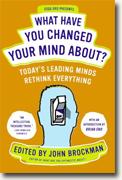What Have You Changed Your Mind About?
John Brockman
book reviews:
· general fiction
· chick lit/romance
· sci-fi/fantasy
· graphic novels
· nonfiction
· audio books
· author interviews
· children's books @
curledupkids.com
· DVD reviews @
curledupdvd.com
newsletter
win books
buy online
links
home
for authors
& publishers
for reviewers

 |
What Have You Changed Your Mind About?: Today's Leading Minds Rethink Everything John Brockman HarperPerennial Paperback 416 pages January 2009 |
|
The idea originated with artist James Lee Byars: “…gather the hundred most brilliant minds in the world together in a room… and ‘have them ask each other the questions they were asking themselves’.”John Brockman, editor of Edge.org, inserted the technology of the Internet into this intriguing plan and now asks contributors to each anniversary edition to respond to a question “that comes to me, or to one of my correspondents, in the middle of the night.” A particularly tricky question was presented to scientists from a variety of disciplines in 2008 – what have you changed your mind about?
Nevertheless, contributors to What Have You Changed Your Mind About? The topics of essays in this book are as diverse as the authors. Psychologist and computer scientist Roger Schank contemplates the possibility that machines may not have the ability to emulate human intelligence after all. Meanwhile computer scientist Rudy Rucker has come to believe “that we can in fact create humanlike computer programs.” Susan Blackmore, who “trained as a witch, attended spiritualist churches,” and ruined any hope of being taken seriously by academia confesses that she had to change her mind about the existence of paranormal phenomena. And philosopher Mick Bostrom covers all bases with his sensibly simple statement “Since I started my life knowing virtually nothing, I have changed my mind about virtually everything.” From Martin Rees, Freeman Dyson, Ray Kurzwiel, Alan Alda, and dozens of others come surprising confessions of those change-of-heart moments that are so difficult to accept. There is no need for the reader to agree with any of the opinions. After all, as Randolph Hess points out, “I used to believe that you could find out what is true by finding the smartest people and finding out what they think. However, the most brilliant people keep turning out to be wrong.”What Have You Changed Your Mind About? For readers who remain open and dispassionate, What Have You Changed Your Mind About? Originally published on Curled Up With A Good Book at www.curledup.com. © Deborah Adams, 2009 |
| Also by John Brockman: |
|
|
|
 Click here to learn more about this month's sponsor! |
|
| fiction · sf/f · comic books · nonfiction · audio newsletter · free book contest · buy books online review index · links · · authors & publishers reviewers |
|
| site by ELBO Computing Resources, Inc. | |
 Most of us are familiar with the bumper sticker that reads I’ve made up my mind – don’t confuse me with the facts. It’s a malady to which we all fall victim, and the wealth of misinformation spread through viral emails has certainly exacerbated the syndrome. The average person, having chosen an opinion based on the first headline that conforms to his or her personal beliefs, steadfastly refuses to seek out or accept any contradictory information. If admitting that we’re wrong is so difficult for the average mind, it must be far more challenging for the genius-level scientists who spend their days examining, researching, and formulating well-thought-out theories.
Most of us are familiar with the bumper sticker that reads I’ve made up my mind – don’t confuse me with the facts. It’s a malady to which we all fall victim, and the wealth of misinformation spread through viral emails has certainly exacerbated the syndrome. The average person, having chosen an opinion based on the first headline that conforms to his or her personal beliefs, steadfastly refuses to seek out or accept any contradictory information. If admitting that we’re wrong is so difficult for the average mind, it must be far more challenging for the genius-level scientists who spend their days examining, researching, and formulating well-thought-out theories.